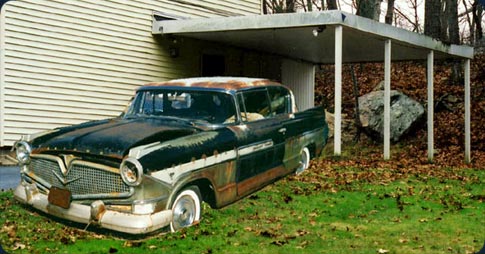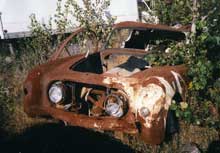When George Met Donald
It all started aboard the Queen Elizabeth (if the current ocean liner is "QE2," can we call its predecessor "QE1"?). Donald Healey, the British designer who had been building limited-production Riley-engined Healey Silverstone sports cars, Westland roadsters, Abbott dropheads and Elliot saloons, was on his way to America in search of Cadillac engines to pep up his cars. Aboard ship he met George Mason, head of Nash Motors, and the two men hit it off. "If you can't get engines from Cadillac," George told Donald, "come see me." He couldn't, so he did.
Thus was born the Nash-Healey, an American drive train in an English chassis and, at first, English body. Mason insisted on a Nash-themed grille, so the prototype borrowed a snout from Bill Flajole's NXI, a concept car that grew up to become the Metropolitan. The production Nash-Healey, which used the grille of the 1951 Ambassador, debuted at Paris and London in the Autumn of 1950. Healey campaigned several of the cars at LeMans with considerable success in 1950-53. The Healey-modified engine, a Nash Ambassador ohv six with aluminum head and twin SU carburetors, became an optional engine for US Ambassadors in 1953.
Mason didn't like the British-bodied car, which was built in aluminum by Panelcraft. He had Pininfarina, then doing some contract work for Nash, build up a more voluptuous body in steel, and this became the 1952 Nash-Healey. Its signature grille, which surrounded the headlights, was adapted for Nashes in 1955 and '56. A Nash-Healey coupe, appropriately called "LeMans," was introduced at the 1953 Chicago Auto Show and replaced the roadster in production. In mid-1954, the coupe was given a new roof profile with "dog leg" C-pillar.
The 1954 merger of Nash with Hudson and Mason's subsequent untimely death, not to mention the $1,000 dollar loss the company took on each car, resulted in cancellation of the program after 506 cars were built. Healey, however, became a household word on the success of the Healey Hundred, which enjoyed a long career as the Austin-Healey.
Perhaps only 30 Nash-Healeys were the late style coupe, one of whose remains grace the top of this page. The car was snapped a couple of years ago at Ed Moore's magical Bellingham Auto Sales in Massachusetts. It was in pieces when it left there last month, but Ed still has some Nash-Healey parts and information, and lots of other cars.

